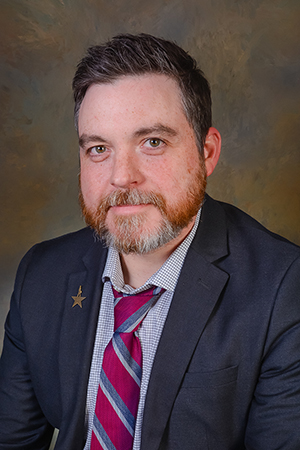A maker space is a place equipped with materials for community members to go in and create ways to solve problems through art or technology. Many maker spaces are often male-dominated areas with a focus such as computer science or coding.

But St. Cloud State University English professor Dr. Michael Dando and his colleagues are looking to change that.
“We’re broadening our understanding of who can be in those spaces and what those spaces can do,’ he said.
Dando was inspired by the character Shuri from “Black Panther” who sees a problem then uses the resources she has available to solve it. He worked last year on broadening the understanding of maker spaces and what those spaces can do. Dando worked on a maker space together with Dr. Nathan Holbert from Teachers College Columbia and John Jennings from the University of California Riverside.
“What we’re saying is ‘how does your way of thinking, your cultural background, influence how you solve problems,” he said. “We’re creating a space for folks to think about a problem or an issue or challenge in their community then create, design and fabricate a possible futuristic response.”
Dando approached the problem from multiple angles, including research and piloting a project with colleagues nationally and working with schools and the United Way locally to engage young people in St. Cloud. He was St. Cloud State University’s 2020 Miller Scholar recipient. His project “Remixing Wakanda: Critical Multimodal Literacies through Afrofuturistic Design Studies” focused on developing critical multimodal literacies through narrative.
Dando, Jennings and Holbert first piloted the maker space concept in 2019 in New York. The women who worked in that space looked at problems in their own communities and lives and used art to envision what a futuristic solution might look like. One participant envisioned a trash can that prevented littering by generating energy, another envisioned a hoodie that was a diagnostic device to help people monitor their health while wearing it.
“They are thinking about concerns real to them now and their communities now,” Dando said. “And they’re thinking about future solutions based on their own experiences and families.”
During the pandemic as part of his Miller Scholar work, Dando worked with middle and high school women in St. Cloud in a Zoom virtual maker space on how they can take background from their own knowledge, families, and expertise to solve problems. They used technology to make 3D models of their designs.
In February, he worked with a team of education and comic creators on a Comic Book Literacy program with the United Way. The project brought together comics professionals, area educators and St. Cloud high school students to help the children create, write, design and publish their own original comic books.
Dando worked with Jennings, a Eisner award winner, Nasir Jones Hip Hop scholar at Harvard, and editor of Megascope Comics, with David Brame, an award winning graphic novel artist, and Dr. Nathan R. Holbert from Teachers College Columbia, one of the top learning scientists in the United States on the project. Dando have published several academic journal articles on their findings and have presented at both national and international educational research conferences on their research.
“These are some of the top leading-edge thinkers and leaders in the field, “Dando said. “The idea is that you don’t have to go someplace else to be a leader, you can be a leader in your own back yard. You can be a leader right here, right now. You don’t have to wait for somebody else.”
Dando is working to change the narrative for young people from what they’ve been told their whole lives by society by bringing culture in to be a part of the STEM and technology they are learning elsewhere.
Mathematics was involved in the Underground Railroad. People escaping slavery used computations to guide themselves northward by following the stars. Technology and mathematics is used in sewing and basket weaving and all making practices, Dando said.
He worked with the students to make self-portraits and develop files using laser cutters, CAD and 3D printers, coding and programming. Then he ended every maker space session by bringing it all back together and looking at how what they were doing as individuals have a place in society and culture by discussing why it matters to them and to the broader community.
“That’s the critical part that lots of STEM programs miss, ‘why are you doing this, learning this, what does learning this tell you about yourself and your community?’,” he said. “We’re the only people doing this this way. We’re the only ones in Minnesota doing this work at the moment.”
The prestigious Miller Scholars program recognizes and rewards faculty members who have a demonstrated record of motivation, excellence and leadership in teaching and learning. Established through a generous endowed gift by James W. and Marion Miller, prospective Miller Scholars undergo a rigorous selection process as they advance a high-quality project proposal that elevates their teaching and learning to a significantly higher level.
